
Muhammad Zia-ul-Haq was a Pakistani military officer who served as the sixth president of Pakistan from 1978 until his death in 1988. He also served as the second Chief of Army Staff of the Pakistan Army from 1 March 1976 until his death.

Zulfikar Ali Bhutto was a Pakistani barrister, politician, and statesman. He served as the fourth president of Pakistan from 1971 to 1973 and later as the ninth prime minister of Pakistan from 1973 to 1977. Bhutto founded the Pakistan People's Party (PPP) and served as its chairman until his execution.
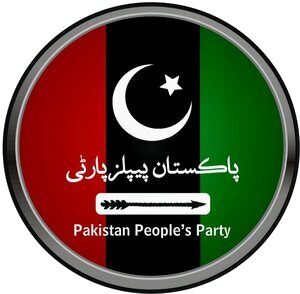
The Pakistan People's Party is a centre-left political party in Pakistan, currently being the largest in the Senate and second-largest party in the National Assembly. The party was founded in 1967 in Lahore, when a number of prominent left-wing politicians in the country joined hands against the rule of Ayub Khan, under the leadership of Zulfikar Ali Bhutto. It is affiliated with the Socialist International. The PPP's platform was formerly socialist, and its stated priorities continue to include transforming Pakistan into a social-democratic state, promoting egalitarian values, establishing social justice, and maintaining a strong military. It, alongside the Pakistan Muslim League-Nawaz and the Pakistan Tehreek-e-Insaf, is one of the three largest political parties of Pakistan.

Begum Ra'ana Liaqat Ali Khan was the First Lady of Pakistan from 1947 to 1951 as the wife of Liaquat Ali Khan who served as the 1st Prime Minister of Pakistan. She was also the first female governor in Pakistan, serving Sindh. She was one of the leading woman figures in the Pakistan Movement, and a career economist, and prominent stateswoman from the start of the cold war till the fall and the end of the Cold War.

Begum Nusrat Bhutto was an Iranian-born Pakistani public figure who served as the first lady of Pakistan from 1971 to 1977, as the wife of Zulfikar Ali Bhutto, who served as the President and Prime Minister of Pakistan. She also served as a senior member of the federal cabinet between 1988 and 1990, under Benazir Bhutto's government.
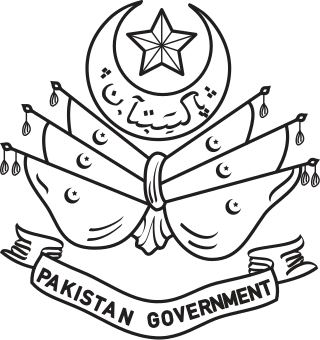
The Constituent Assembly of Pakistan was established in August 1947 to frame a constitution for Pakistan. It also served as its first interim parliament. It was dissolved by the Governor-General of Pakistan in 1958.
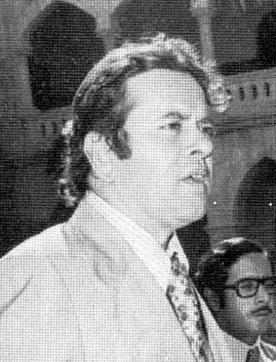
Abdul Hafeez Pirzada was a Pakistani lawyer, legal theorist, and politician, who served variously as minister for information, minister for law, minister for finance, and minister for education under president and later prime minister Zulfikar Ali Bhutto from 1971 to 1977. As law minister, he is credited as a principal draftsman of the Constitution of Pakistan, passed in 1973.

Aziz Ahmed OBE HPk was a career Pakistani statesman and a diplomat during the Cold War, serving in the capacity as 12th Foreign Minister of Pakistan from 1973 until 1977. Prior to that, Ahmad served as the Pakistan Ambassador to the United States (1959–63) and eventually appointed Foreign secretary (1960–67) by President Ayub Khan.
Mumtaz Ali Khan Bhutto, was a Pakistani politician who served as 8th Governor of Sindh and later the 13th Chief Minister of Sindh. He was also the first cousin of late Zulfiqar Ali Bhutto, who was the Prime Minister of Pakistan from 1973 to 1977.
Events from the year 1977 in Pakistan.

General elections were held in Pakistan on 7 December 1970 to elect members of the National Assembly. They were the first direct general elections since the independence of Pakistan and ultimately the only ones held prior to the independence of Bangladesh. Voting took place in 300 general constituencies, of which 162 were in East Pakistan and 138 in West Pakistan. A further thirteen seats were reserved for women, who were to be elected by members of the National Assembly.

Syed Qaim Daim Ali Shah is a Pakistani politician who served as the elected Chief Minister of Sindh for three terms. His last two terms combined, a total of eight years, makes him the longest serving Chief Minister of Sindh. He is Sindh President of the Pakistan Peoples Party (PPP) and was an elected Member of Provincial Assembly (MPA) from PS-220 (Khairpur-1).
Chaudhry Zahoor Elahi was a Pakistani politician who rose to prominence from the small town of Gujrat, Punjab, Pakistan.
The political history of Pakistan is the narrative and analysis of political events, ideas, movements, and leaders of Pakistan. Pakistan gained independence from the United Kingdom on 14 August 1947, when the Presidencies and provinces of British India were divided by the United Kingdom, in a region which is commonly referred to as the Indian subcontinent. Since its independence, Pakistan has had a colorful yet turbulent political history at times, often characterized by martial law and inefficient leadership.

The Governor of Balochistan is the head of the province of Balochistan, Pakistan. The post was established on 1 July 1970, after the dissolution of West Pakistan province and the end of One Unit. Under Pakistan's current parliamentary system, the governorship is a ceremonial position, as a symbol of the federation. The governor is appointed by the centre, whereas the principal head of the provincial government remains the elected Chief Minister of Balochistan.
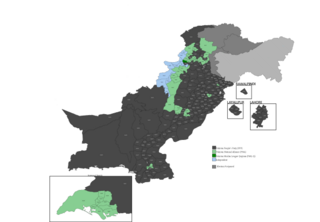
General elections were held in Pakistan on 7 March 1977 to elect 200 members of the National Assembly. They were the second general elections held in Pakistan and the first to be held after the Bangladesh Liberation War.
The 1977 Pakistani military coup was the second military coup in the history of Pakistan. Taking place on 5 July 1977, it was carried out by Muhammad Zia-ul-Haq, the chief of army staff, overthrowing the government of Prime Minister Zulfikar Ali Bhutto.

General elections were held in Pakistan on 16 November 1988 to elect the members of the National Assembly and Senate.
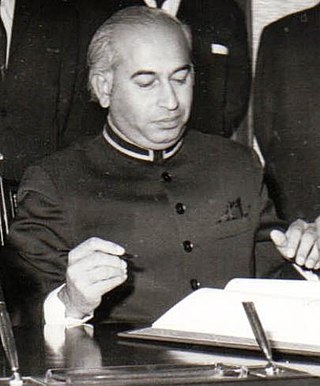
The First Zulfikar Ali Bhutto government was the government of Pakistan led by Zulfikar Ali Bhutto from 1973 until 1977. It was formed after the 1973 Constitution of Pakistan was passed by the Parliament of Pakistan which fully re-established Pakistan as a parliamentary democracy. The government would oversee two different cabinets due to reshuffles, the First Zulfikar Ali Bhutto Cabinet ruled from 1973 until 1974, when the cabinet was reshuffled by Bhutto to the Second Zulfikar Ali Bhutto Cabinet which ruled from 1974 to 1977, which is when general elections were held, and the government was succeeded.
















